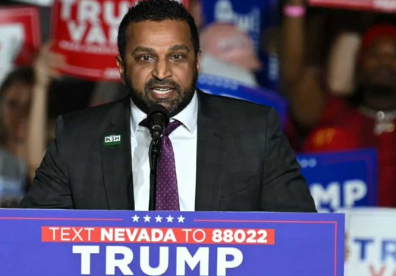Kash Patel’s backing of the Ayodhya Ram Templehas caused a hotly debated issue, which brings into question the role that diaspora politics play in U.S. leadership and foreign policy, further complicating his FBI nomination.
Kash Patel, nominated to join the FBI, has stoked controversy due to his open support for the Ayodhya Ram Temple sparked debates about the suitability of U.S. officials making foreign religious issues part of the discourse. This further showcases how diaspora politics influence U.S. leadership and add to the complex challenges facing his nomination, even raising the question of diplomatic maneuvering in foreign policy.

Kash Patel’s Stance on Ayodhya Ram Temple: A Closer Look
Kash Patel, the former Trump aide, and FBI Director nominee, has made controversy with his vocal support for India’s Ayodhya Ram Temple. His statement mixed American politics with India’s religious dynamics, drawing both applause and criticism. With the Ram Temple still being a controversial issue, the words of Patel bring forth the influence of diaspora communities on global political discourse. His position raises questions about the role of international figures in commenting on sensitive issues, affecting how both U.S. and Indian audiences may view his leadership.
FBI Nominee Kash Patel’s Support for the Ram Mandir Controversy
Kash Patel’s support for the Ram Mandir in Ayodhya has created controversy as U.S. politics get entangled with sensitive global religious issues. His words considered an expression of solidarity with Hindu communities, have raised questions over the role of U.S. officials in commenting on foreign religious matters. With his FBI nomination now going through the process, his stance could impact his confirmation and his leadership as well, thus underlining the intricate connection between international politics, religion, and governance.
Trump’s FBI Pick Kash Patel Voices Support for Ram Temple
Kash Patel is Trump’s FBI nominee. Patel has become a controversial candidate after displaying support for the construction of the Ram Temple in Ayodhya, India. His comments, seen as expressing solidarity with Hindus, have sent shock waves about whether any U.S. official must be entangled in delicate foreign matters. This debate shows how diaspora politics influence U.S. leadership and its implications on foreign relations and the confirmation process of Patel.
This is Kash Patel, Trump's nominee for FBI Director. The Deep State is f*cked. pic.twitter.com/cejy7hhioP
— End Wokeness (@EndWokeness) December 1, 2024
Kash Patel’s Comments Spark Debate Over Ayodhya Ram Temple
It is contentious as its nomination coincides with Kash Patel in the race for the lead position of the FBI. Most Hindus hold the Ayodhya Ram Temple symbolically sacred by religious triumph as the epicenter of religious conflicts in India. His comments thus raise questions about whether officials in the United States have the right to comment on foreign religious matters. While some view it as solidarity with Hindu communities, critics say it could complicate U.S. foreign relations. The controversy also speaks to the growing influence of diaspora politics and its potential impact on Patel’s confirmation.
Kash Patel’s Alleged Support for Ram Temple Draws Attention
Kash Patel’s endorsement of Ayodhya Ram Temple continues to spark heated debate due to his nomination for FBI director. His statements on an issue that has caused so much divisiveness have called into question the diplomatic roles of U.S. officials in speaking about foreign religions. While some see his statements as an expression of solidarity with Hindu communities, critics warn of diplomatic risks. This controversy points towards increasing diaspora political influence in the lives of U.S. foreign policy and leadership, making Patel’s nomination even more controversial.
Nominee to the FBI Kash Patel Involvement in Ayodhya Ram Temple Debate
Kash Patel, Trump’s nominee for the FBI, has been under fire regarding his statements on the Ayodhya Ram Temple issue, which is sensitive in India. His statements have led to concern over the role of US officials in foreign religious affairs. While some see it as solidarity with Hindu communities, critics warn that it could affect U.S. foreign relations and Patel’s confirmation. This debate marks the impact of diaspora politics on American governance and foreign policy, which can influence Patel’s leadership and international relations.

Kash Patel and the Ayodhya Ram Temple: What Did He Say?
Comments made by Kash Patel in favor of the Ayodhya Ram Temple are not without controversy as he was nominated for the post of FBI Director. For some, the temple represents victory; for others, it represents division. This is causing a problem about what US officials are allowed to comment on, specifically regarding foreign religious issues, which many see as an expression of solidarity while others warn that there would be diplomatic implications. The comments only add more controversy to his nomination, because they suggest not only the intersection of religion and politics but international relations.
Trump’s FBI Nominee Kash Patel Supports Ram Mandir Construction
Trump’s FBI nominee, Kash Patel, has already brought controversy with his statements over the construction of Ram Mandir in Ayodhya, India. In defense of the Hindu community, this has led to many speaking out against a U.S. official commenting on sensitive foreign issues. Critics argue that this might affect diplomacy, while others point to it as evidence of political influence. The entire debate raises the question about the role of diaspora politics in shaping U.S. leadership and foreign policy, making it more complex for the confirmation of Patel.
Conclusion
The comments by Kash Patel for the Ayodhya Ram Temple have opened a heated debate that questions U.S. officials commenting on foreign religious and political issues. Others, while viewing his comments as expressions of solidarity with Hindus, focus attention on the growing influence of diaspora politics in shaping U.S. foreign policy. His involvement in this controversy will most certainly determine the contours of his confirmation and leadership when his FBI nomination advances. This is one complex interplay among diplomacy, religion, and politics with tremendous implications for the U.S. policy on diplomacy and international relations.
Also Read: Maharashtra CM: Neither ‘Shinde’ nor ‘Fadnavis’ in the Race! Then who?